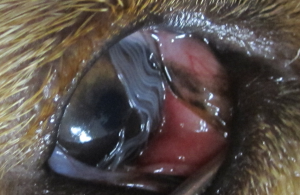
In recent decades, battling against the viruses and persistent strains of bacteria that cause sickness and even death has become life-threatening for both humans and pets. Some viral diseases, like smallpox, malaria, and encephalitis transmitted by mosquitos are contained with vaccines and antiviral drugs that prevent infections from spreading widely around the planet, but they have reached incredible proportions.
In the past decade, John Graham-Brown, from Liverpool University, has led research into a new strain of T callipaeda (Thelazia Callipaeda) that has invaded Europe and is threatening the UK. This particular strain of eye worm is blinding dogs and has recently killed three more canines that had been in Europe and traveled to the UK. After studying this situation, Graham-Brown warns that the UK should begin to carefully monitor dogs coming into the country to prevent an outbreak.
Treatment for T Callipaeda
In cases were dogs were exposed to the eye worm infection and taken to a vet and treated, they were successfully cured. The problem is many pet owners are not aware of the condition or that it leads to blindness when left untreated.
The T callipaeda is a parasitic nematode or a roundworm that is found in the coating of the eye. It is transmitted by fruit flies from one canine to the next canine’s eye. The infection could easily be transmitted to another pet in the same household or even to the humans. The fruit fly is a variety that originates in Europe, and to date, only two humans have reportedly been affected and no household cats.
Owners of all dogs, especially those recently returning home from Europe, are advised to watch for swelling, irritation, and inflammation around the eyes of their dogs. It is advised to take your pet to the vet immediately if they show any signs of irritation or discomfort. If the symptoms are identified and not overlooked, the infectious roundworm can be removed from the dog’s eye, and the dog will be treated with drugs, which brings 98 percent back to health. It is the untreated pet that will suffer blindness.
From Europe Into the UK
This “new” strain of roundworm that effects the eye was first discovered in canines in 1910 in China. In over one hundred years, many canines have been affected and over 250 human cases have been reported. In 2017, T. callipaeda has become a verifiable epidemic across Europe, including in these countries: Italy, France, Switzerland, Spain, Germany, Portugal, Hungary, Greece and the Baltic countries. While it does not target German Shepherds exclusively, GSDs do travel across these countries frequently. The worm does no discriminate and affects all breeds.
The Pet Travel Scheme or PETS has instigated a movement that has led to the dogs that are traveling from these countries into the UK must have their rabies vaccinations up to date and have been treated for tapeworms between one and five days before entering the country.
Vets in the UK have reported there has been three cases recently found in dogs returning from Europe that actually were in compliance with this new ruling, but were then treated for T. callipaeda.
This was a radical ruling for PETS to originate, but it appears that it will need to be reviewed because veterinary researchers report many more cases appearing in the UK as the result of European travel where the roundworm is reaching critical mass. Graham states that “It’s definitely a risk to travel with pets to Europe.”
Image credit: https://parasitesandvectors.biomedcentral.com/articles/10.1186/1756-3305-5-124







